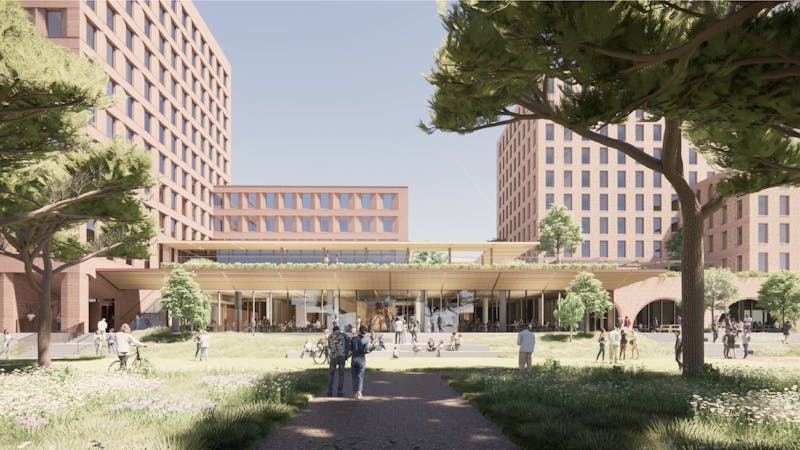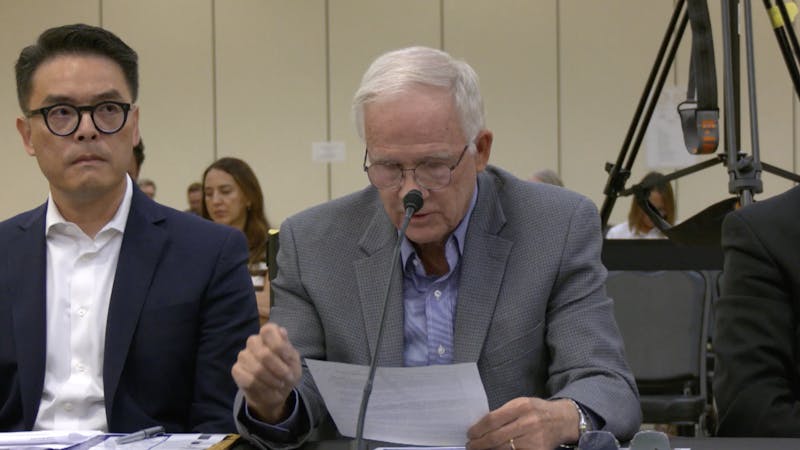Going green requires new sustainable dining options
"Going green" is a popular trend in today's society, though many fail to realize what this truly means.It's not just about recycling. Instead, what and how we choose to eat is one of the most fundamental ways we interact with the environment on a daily basis. Our food consumption reveals a direct relationship between humans and the Earth. The problem, however, is that this has become a long-distance relationship, which many can agree is difficult and detrimental to both parties.
The average food item travels between 1,500 and 2,500 miles between the site of production and the site of final purchase or consumption. In terms of the environment, this transportation involves the burning of fossil fuels - the primary source of anthropogenic carbon dioxide emissions - which then negatively impacts climate change. This simply demonstrates one of the negative implications of the modern food industry, specifically on our environment. Some also argue that the essential disconnection of people to their food results in a disconnection to the Earth, contributing to a general social apathy with respect to the environment.
Additionally, food and food production are at the heart of many other important issues, including social justice, health and economic inequality. For example, since 1997, the United States Department of Justice has successfully taken legal action against seven cases of slavery involving well over 1,000 farm workers in Florida. In one case, farm labor supervisors were sentenced in federal court for enslaving tomato pickers, including beating, chaining and locking them inside a truck at night. As far as health goes, the rate of diabetes alone - which has grown twelve-fold in the last 50 years - demonstrates the effects of our food industry and consumption choices. Lastly, one example of economic inequality in the system is that only four giant corporations control 80 percent of the U.S. beef supply, while local farmers often struggle to make ends meet. So what can we do about it?
We can get Rice University involved in the Real Food Challenge. This organization involves a network of students from universities across the United States who have taken a stand not only to promote local food, but real food: food that is ethically produced, with fair treatment of workers, equitable relationships with farmers and humanely treated animals. This is food that is environmentally sustainable, grown without chemical pesticides, large-scale monocropping or huge carbon footprints. Real food is healthy, delicious, builds communities and has the potential to inspire large-scale social change.
More than 300 universities have begun the Real Food Challenge, institutions like Brown University, Columbia University, Harvard University and Yale University. So why isn't Rice, one of the "New Ivies," on the list?
I am a transfer student from Boston College, where I was an avid member of "Real Food BC." Inspired by the Real Food Challenge, BC students formed their own branch of the movement. In the club's first year, students established a campus farmers' market, a student-run community garden and an organic campus restaurant as a sustainable dining alternative. Rice has a farmers' market and community garden, but it was the students' involvement and enthusiasm for the cause that differentiates Boston College from Rice.
Last semester, I took a course here, ENST 302: Environmental Issues: Rice into the Future, where we formed teams to work on projects promoting campus sustainability. My group conducted an experiment to gauge student interest in increasing the amount of local food provided on campus, and we found that many students are interested in this idea. So why hasn't anyone taken a stronger stance on the issue?
Although we have a farmer's market, student attendance and involvement seem to be low. And although we have a community garden, the size and involvement from students can also be increased. Lastly, Rice would certainly benefit from creating a student-run sustainable dining option, which would promote local, organic food, provide jobs for students and function as another social gathering place. At the University of California, Berkeley, students successfully replaced a Panda Express with a student-run, real food co-op, like at BC, which uses their own community garden and works with student meal plans.
The creation of a food club at Rice would work to promote the efforts of the Real Food Challenge on campus. I believe a club like this is necessary to promote some of the more powerful options for change in food production and consumption. For last semester's project, we worked with Director of Residential Dining David McDonald, who deals with the College Food Service Department. He encouraged these changes, yet also admitted inherent difficulties. Many of the changes our group suggested are infeasible due to expense and cultural resistance. A food group, however, would work to change both.
Interested yet? The Rice Environmental Club is hosting its annual conference, this year titled "Epicuriosities: Save Your Planet and Eat It, Too!" Speakers will come and talk about the environmental and health impacts of modern, large-scale agriculture, and there will be a panel discussion with David McDonald and a representative from Houston Avocado, one of Rice's biggest produce distributors, about integrating more sustainable and local food in serveries. I will also be talking about the Real Food Challenge and collecting e-mails for those who are interested in joining this movement.
I hope that you will be interested in learning more about food, an integral part of our daily lives, and join us in bringing more sustainable options to our university.
Krisina Zuniga is a Baker College sophomore.
More from The Rice Thresher

Rice announces Chao College as 12th residential college
Rice announced that the 12th residential college will be named Ting Tsung and Wei Fong Chao College Aug. 19. The college, set to open in fall 2026, will contain nearly 300 on-campus beds.
Dining access fund announced following on-campus unlimited meal swipes
Rice announced new food assistance programs on Tuesday to account for the controversial change in the on-campus meal swipe plan.

Rice disaster prediction model discussed at hearing on deadly Central Texas floods
The House and Senate Select Committees on Disaster Preparedness and Flooding held a hearing on July 31 in Kerrville to address the deadly July 4 flooding in Central Texas. The flooding along the banks of the Guadalupe River killed 108 people, including 37 children. In the charged hearing, Texas lawmakers and flood survivors criticized the local response to the disaster.


Please note All comments are eligible for publication by The Rice Thresher.